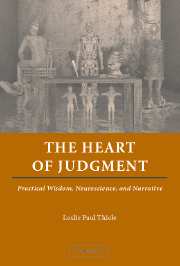2 - The Indispensability of Experience
Published online by Cambridge University Press: 20 July 2009
Summary
Experience is never limited, and it is never complete; it is an immense sensibility, a kind of huge spider-web of the finest silken threads suspended in the chamber of consciousness, and catching every air-borne particle in its tissue. … The power to guess the unseen from the seen, to trace the implication of things, to judge the whole piece by the pattern, the condtiion of feeling life in general so completely that you are well on your way to knowing any particular corner of it – this cluster of gifts may almost be said to constitute experience.
Henry JamesIt is more important to study men than books.
La RochefoucauldFollowing a Kantian line of thought, Anne Colby and Lawrence Kohlberg observe that “Moral judgments … direct, command, or oblige us to take some action. Moral prescriptions are not merely commands to perform particular actions, however. They are imperatives deriving from some rule or principle of action that the speaker takes as binding on his own actions.” Moral judgments, Colby and Kohlberg are saying, are products of the application of abstract laws to particular cases. This Kantian position has enjoyed widespread endorsement.
Undoubtedly, some moral judgments do arise through a process that involves reflecting on and reasoning about general principles. But this is more the exception than the rule. For the most part, moral judgment is not a process of deriving imperatives for action from abstract propositions.
- Type
- Chapter
- Information
- The Heart of JudgmentPractical Wisdom, Neuroscience, and Narrative, pp. 70 - 115Publisher: Cambridge University PressPrint publication year: 2006



